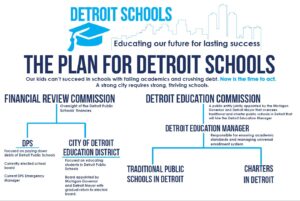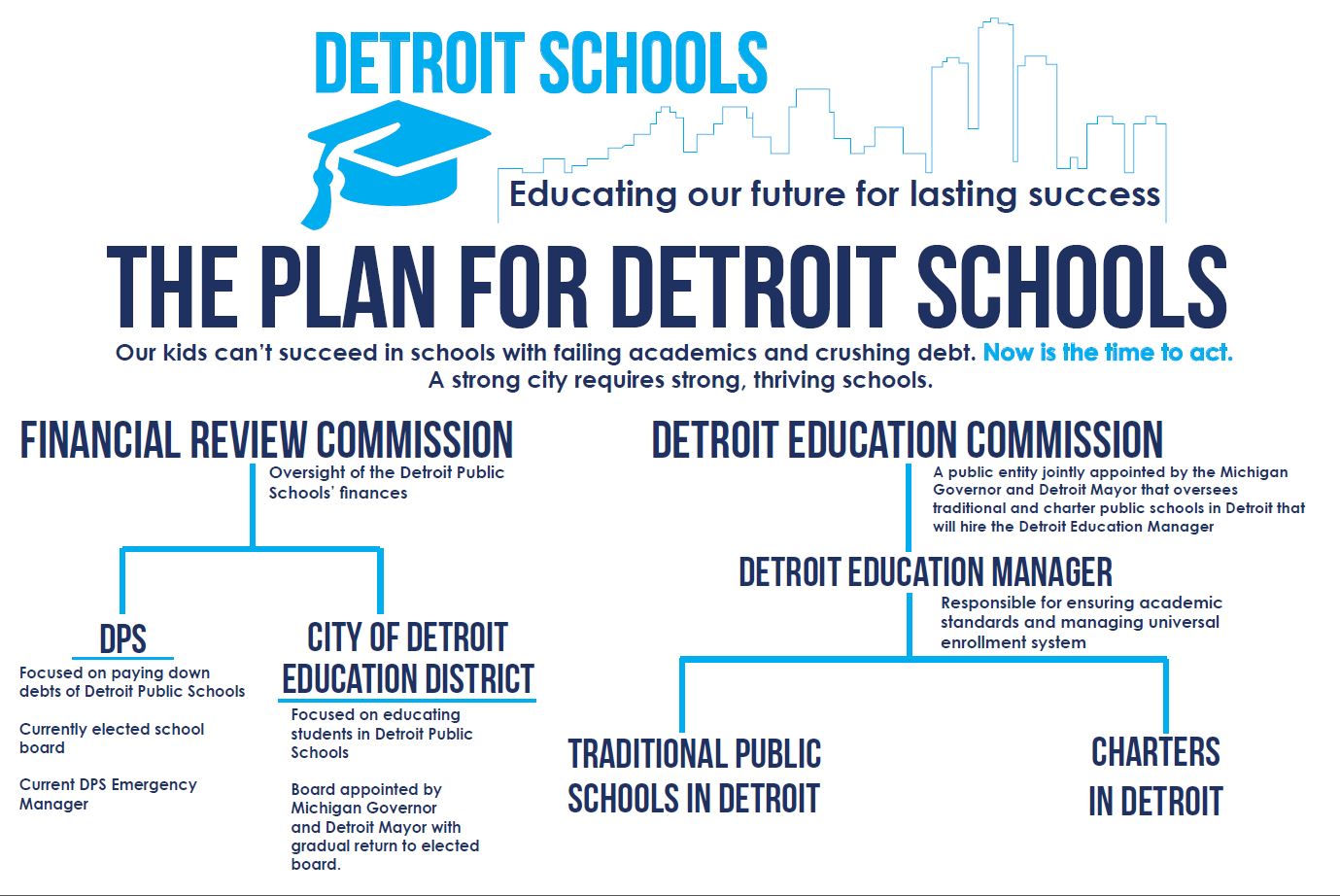In the last two months, there’s been some seriously innovative proposals to revamp the school governance structure in Detroit. As an education professional focused on city-level reforms like this, analyzing the various plans has been incredibly interesting. As a native Michigander and close observer of all things Detroit, my fixation has reached a whole new level.
In both cases, I’m driven by the fact that academic achievement in Detroit is abysmal: only 3 percent of 8th graders scored proficient or above in math on the 2013 NAEP TUDA. Only 9 percent were proficient of above in reading. Achievement scores for the 51% of students that attend charter schools are better but have plenty of room for improvement.
The proposed reforms hold tremendous promise to improve the status quo. Here’s my take on the developments thus far.
Debt Isolation
A month ago, Governor Rick Snyder of Michigan proposed a bold plan to free Detroit’s public schools from the burden of the district’s $483 million operating debt. His OldCo/NewCo asset transfer strategy, modeled after the one that General Motors used in 2009, has received a lot of coverage and commentary (here, here).
But the debt-isolation strategy is only part of the story. Solving the district’s financial woes won’t necessarily produce the academic improvements Detroit’s students deserve. That will require more fundamental change to the city’s system of schools.
 The Detroit Education Commission
The Detroit Education Commission
Along those lines, Snyder complemented his financial intervention with a proposal to create the Detroit Education Commission (DEC). The DEC (similar to a proposal made by Coalition for the Future of Detroit Schoolchildren) would hold accountable all public schools in the city, whether in the district or charter sector. The DEC’s board, initially appointed by Snyder and Detroit Mayor Duggan, would have expansive power, including closing schools for persistently poor performance and deciding where new schools operate. It would also be responsible for a new common enrollment system. The DEC resembles the chancellor’s office in The Urban School System of the Future.
It’s important to underscore that while the OldCo/NewCo would target the district’s financial problems, the DEC would affect parental choice, the supply of schools, governance, accountability, and more.
Such changes implicate a wide array of stakeholders, and details of Snyder’s plan have not yet been released, so there’s still a great deal of uncertainty about how this will play out. For instance, would some students still be assigned to schools or would the system become all-choice? What would be the relationship between the DEC and charter authorizers? What roles would the Education Achievement Authority and the State School Reform Office play? (Andy Smarick, Julie Squire, and I lay out other questions here.)
Plans, Politics, and Potential
Although it’s received the most press, Snyder’s plan isn’t the only one floating around right now. If you’re keeping track, there are now three plans for Detroit’s schools, which is kind of incredible for a city which was criticized for being fragmented and leaderless not to long ago.
The first was a multifaceted plan proposed by The Coalition for the Future of Detroit’s Schoolchildren two months ago which called for the state to take on DPS’s debt and returning it to local control, abolishing of the Education Achievement Authority, and creating the DEC with ties to the Mayor’s office (among many other recommendations).
The second is Snyder’s – see above.
Duggan initially recoiled from Snyder’s plan and finally proposed his own just last week. His middle-of-the-road plan between the Coalition’s and the Governor’s has all the same players with much more local control. As with the other plans, details are scarce.
If a single plan is agreed upon, it’ll likely land somewhere between Duggan’s and Snyder’s with the primary points of contention being who controls what. My take is that Duggan should have auspice over the DEC but Lansing should continue to steer DPS out of financial trouble.
One aspect that all of the plans share is the state’s role in relieving Detroit Public Schools of its crushing debt. In order to execute the OldCo/NewCo debt isolation strategy, the majority republican legislature must agree to distribute the financial burden across that state, which they’re reluctant to do.
Fortunately, Snyder, Duggan, and the legislature will have some time to work it all out. The recent passage of a school aid bill — which includes $50 million in unappropriated funds that could be used to help DPS — means that consideration of additional aid to the district will have to wait until the fall. The success and sustainability of any plan will depend on the ability for Michigan’s republican governor and Detroit’s democratic mayor to compromise.
Snyder and Duggan would be wise to start with the broad swath of middle ground and put together a smart, detailed plan that they can sell jointly to Lansing.
There’s a huge potential upside for Detroit’s families if smart fiscal recovery is combined with a new innovative governance model and local voice. The downside, however is equally huge. If Snyder refuses to compromise, we’ll likely see a continuation of the current dynamic in which state intervention is unwelcome and local resistance makes change slow, painful, and politically charged.
As much as any city in America, Detroit is now showing that systemic reform is possible in urban education. Let’s hope partisan politics don’t sink the incredible potential for innovative school governance that’s at its doorstep.

